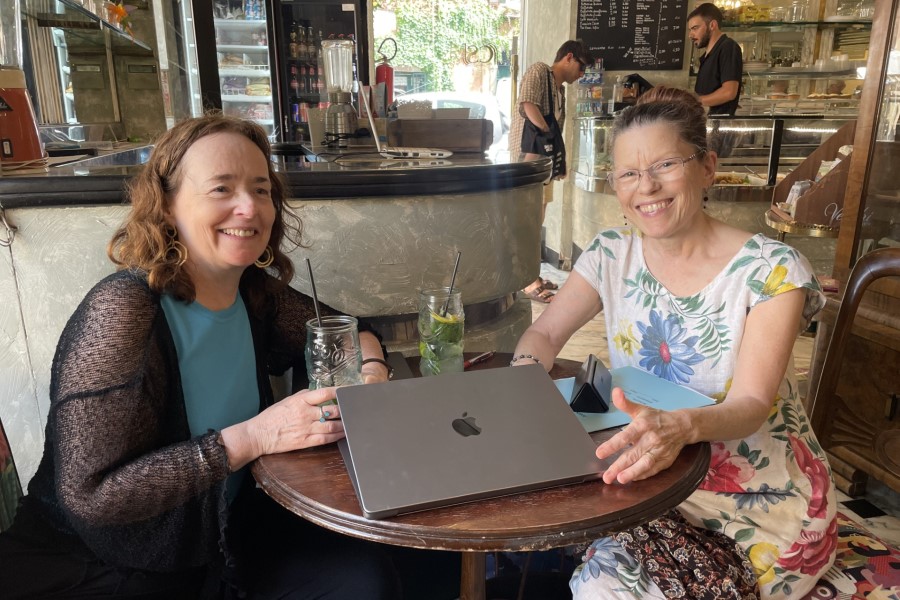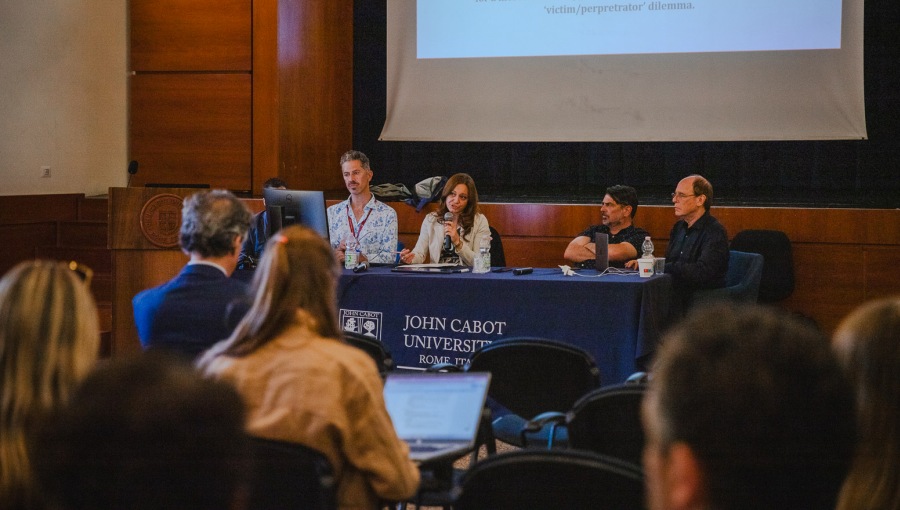Journalist Giulia Cerino Discusses Populism and Extremism
“There are three main words that will help you to understand how our jobs as reporters have changed, and to describe the era that we are living in: immigration, nationalism, and racism,” says Giulia Cerino.
On October 7, 2018, John Cabot hosted Italian journalist Giulia Cerino for a discussion entitled “Populism and Extremism.” An expert on extremism, she has recently produced reports on European fascist groups and on (anti-)immigration groups in Hungary for Italian news programs Servizio Pubblico and Piazzapulita, and published a book on young Europeans who left to fight for ISIS, based on interviews with their mothers. She is currently also working on populism in the United States.
Over the course of her career, Cerino has witnessed a steady growth on both the populist and nationalist fronts. She was in France in 2013 and witnessed Marine Le Pen build her National Front party. She then went to Poland, one of the main examples of populism in Europe, along with Hungary and Viktor Orban, who she described as “the strongest demagogue Europe has ever seen.”
Cerino explained how the three words, “immigration,” “nationalism,” and “racism” add up to “populism.” Describing the strategies common to populism, she said that the most pronounced were economic nationalism and restrictions on imports from abroad in order to protect internal markets, the fight against corrupt government and big businesses, and hostility toward the media, as Trump has exemplified in the United States.
In addition, Cerino illustrated the relationship between cultural nationalism and populist movements. She described Steve Bannon, whom she interviewed, as a demagogue and a nationalist, and stressed how populists around the world use the same simplistic ways of delivering dangerous messages, making them more believable to their audiences.
She also discussed populists’ “us against you” attitude, and how the “you” is often identified with immigrants. In fact, she considered the war against immigration to be something that all European populists, along with the Trump administration, have in common. Since immigration is identified with radical Islam, the more ISIS attacks Europe and Western countries, the more populist parties grow.
After these observations on the current political climate, Giulia answered questions from the audience:
As a reporter, how are you dealing with the spread of fake news, and how has that shaped your approach to your job?
Our most important responsibility is fact-checking. Unfortunately, we reporters produce fake news too sometimes. Therefore, our main problem is not just avoiding the spread of fake news, but rather trying not to produce it. Many of us are going back to the classic way of finding our sources, which often means calling them on the phone directly.
It has been said that with strong ideologies, there is always a strong leader. Do you think these ideologies could survive without such a leader?
I don’t think they could survive. That’s why all the leftist parties around the world are dead. There have no leaders. Bernie Sanders was a leader, a leftist populist leader too, which is the reason that he was doing so well. In Italy, we had Matteo Renzi. Perhaps Macron is the only good leftist leader remaining. I think that populism is the only movement that can survive right now.
When would you say that populism really started? Was it in 2016, with President Trump’s election? Or was it in 2012, with the Tea Party movement in America?
I think that it first started in Europe, which explains why Bannon is so interested in us right now. Italy, along with central and Eastern European countries like Poland and Hungary, have become the model. The United States came after, if we consider that Viktor Orban was elected in 2010 and has been re-elected four times since then.
Can you tell us more about your project concerning ISIS?
My book is about the role of mothers of foreign fighters before, during, and after ISIS. I interviewed many of these mothers from all around Europe. These mothers are now crying over their sons and receiving no help from anyone. They have been left alone, when in reality they were the first to understand what was happening with their children, and in many cases, to denounce their sons’ intentions to leave for Syria or Iraq. Nobody stopped them from leaving, though. No police or embassy did anything to stop them because they thought they would never come back.
All foreign fighters are from Western countries or European citizens, with Western passports. They started leaving their countries from around 2011 until 2016, and all took part in the ISIS caliphate in Syria and Iraq. Now many of them are returning. This return is one of the main political problems for both Europe and the United States. In fact, anti-terrorism units are very busy because Europe did not expect these foreign fighters to return. It’s a problem now for national security. And of course, populism takes advantage of the problem, since securing borders is one of populists’ key issues.
When you interviewed Bannon, did he speak about how he was going to shape the campaigns of the political parties for the upcoming European elections?
Yes, he said he wants to be the strategist. In addition, he said he wants to improve reactions towards the media. For example, when the media says something negative about a party, the party must reply immediately. There needs to be a quick reaction to the comments. This is one of the main strategies Bannon would like to use in Europe.






